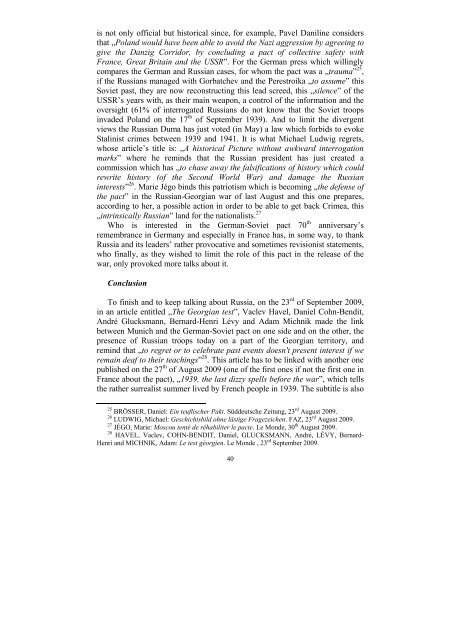The Molotov-Ribbentrop Pact - ELTE BTK Történelem Szakos Portál
The Molotov-Ribbentrop Pact - ELTE BTK Történelem Szakos Portál
The Molotov-Ribbentrop Pact - ELTE BTK Történelem Szakos Portál
Create successful ePaper yourself
Turn your PDF publications into a flip-book with our unique Google optimized e-Paper software.
is not only official but historical since, for example, Pavel Daniline considers<br />
that „Poland would have been able to avoid the Nazi aggression by agreeing to<br />
give the Danzig Corridor, by concluding a pact of collective safety with<br />
France, Great Britain and the USSR”. For the German press which willingly<br />
compares the German and Russian cases, for whom the pact was a „trauma” 25 ,<br />
if the Russians managed with Gorbatchev and the Perestroika „to assume” this<br />
Soviet past, they are now reconstructing this lead screed, this „silence” of the<br />
USSR’s years with, as their main weapon, a control of the information and the<br />
oversight (61% of interrogated Russians do not know that the Soviet troops<br />
invaded Poland on the 17 th of September 1939). And to limit the divergent<br />
views the Russian Duma has just voted (in May) a law which forbids to evoke<br />
Stalinist crimes between 1939 and 1941. It is what Michael Ludwig regrets,<br />
whose article’s title is: „A historical Picture without awkward interrogation<br />
marks” where he reminds that the Russian president has just created a<br />
commission which has „to chase away the falsifications of history which could<br />
rewrite history (of the Second World War) and damage the Russian<br />
interests” 26 . Marie Jégo binds this patriotism which is becoming „the defense of<br />
the pact” in the Russian-Georgian war of last August and this one prepares,<br />
according to her, a possible action in order to be able to get back Crimea, this<br />
„intrinsically Russian” land for the nationalists. 27<br />
Who is interested in the German-Soviet pact 70 th anniversary’s<br />
remembrance in Germany and especially in France has, in some way, to thank<br />
Russia and its leaders’ rather provocative and sometimes revisionist statements,<br />
who finally, as they wished to limit the role of this pact in the release of the<br />
war, only provoked more talks about it.<br />
Conclusion<br />
To finish and to keep talking about Russia, on the 23 rd of September 2009,<br />
in an article entitled „<strong>The</strong> Georgian test”, Vaclev Havel, Daniel Cohn-Bendit,<br />
André Glucksmann, Bernard-Henri Lévy and Adam Michnik made the link<br />
between Munich and the German-Soviet pact on one side and on the other, the<br />
presence of Russian troops today on a part of the Georgian territory, and<br />
remind that „to regret or to celebrate past events doesn't present interest if we<br />
remain deaf to their teachings” 28 . This article has to be linked with another one<br />
published on the 27 th of August 2009 (one of the first ones if not the first one in<br />
France about the pact), „1939, the last dizzy spells before the war”, which tells<br />
the rather surrealist summer lived by French people in 1939. <strong>The</strong> subtitle is also<br />
25 BRÖSSER, Daniel: Ein teuflischer Pakt. Süddeutsche Zeitung, 23 rd August 2009.<br />
26 LUDWIG, Michael: Geschichtsbild ohne lästige Fragezeichen. FAZ, 23 rd August 2009.<br />
27 JÉGO, Marie: Moscou tenté de réhabiliter le pacte. Le Monde, 30 th August 2009.<br />
28 HAVEL, Vaclev, COHN-BENDIT, Daniel, GLUCKSMANN, André, LÉVY, Bernard-<br />
Henri and MICHNIK, Adam: Le test géorgien. Le Monde , 23 rd September 2009.<br />
40













